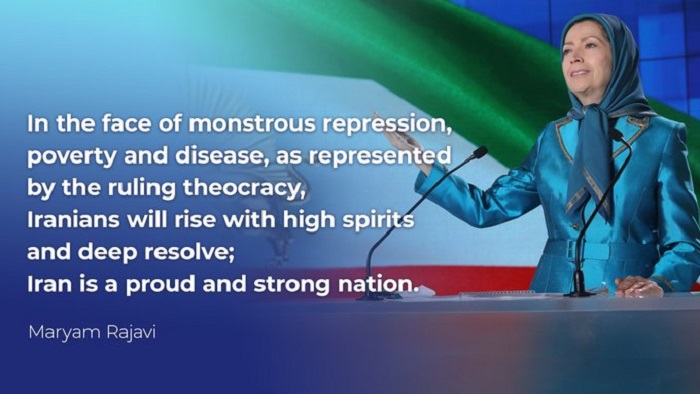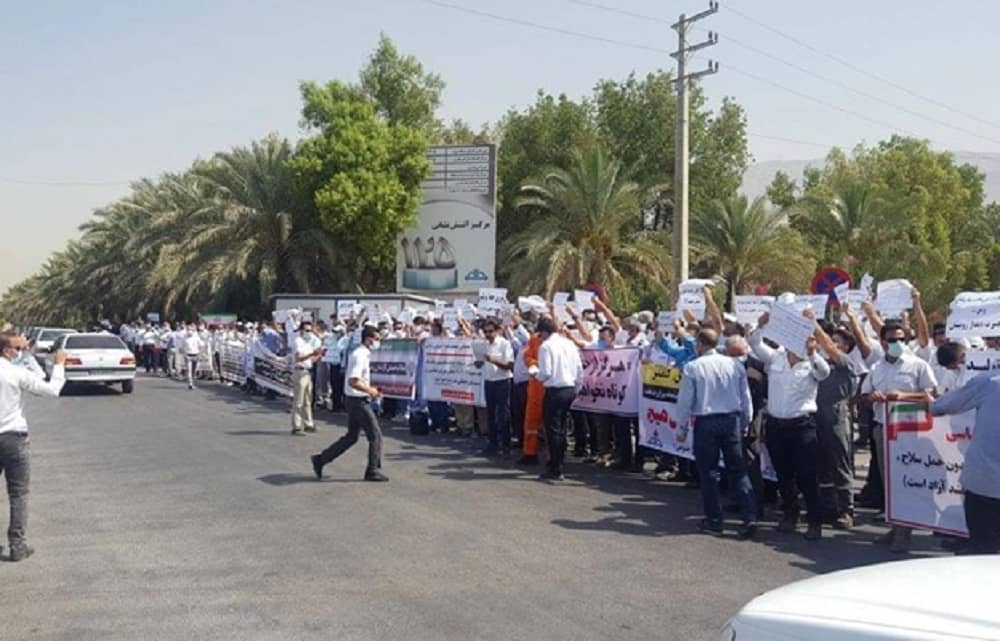
(PMOI / MEK Iran) and (NCRI): Nationwide strike by contract workers at oil refineries, petrochemicals, and power plants.
Since last year, Iran’s contract employees have gone on strike twice. In July 2020, they began their first wave of strikes, which lasted a month and a half. If the regime officials do not meet the workers’ requests, the workers have vowed to go on strike again.
The second phase of the oil workers strike
In March 2021, the oil workers began the second phase of their strike. The strike was more widespread this time than it had been previously. They launched a campaign known as 10-20, in which they would labour for twenty days and receive ten days of paid leave, as well as be classified as official employees.
A new wave of strikes has now spread across Iran. Hundreds of thousands of workers protested in 114 cities, with over 40% of workers continuing their strike and 60% returning to work. The Iranian oil workers’ strike received widespread international publicity, and several national and international labour unions backed the strike.
On June 30, the Associated Press reported that “footage has spread across social media showing construction workers at 60 oil and petrochemical installations, largely in the country’s oil-rich south, walking off their jobs in protest.”

(PMOI / MEK Iran) and (NCRI): Iran: Strike by contract workers in oil and petrochemical industries spreads to more cities.
The implications of the oil workers’ strike
Officials from the regime, notably former President Mahmoud Ahmadinejad, have also warned of the implications of the oil workers’ strike.
“I warn all related authorities and officials that disregarding the protests of those who have found all usual forms to express their demands blocked will not carry good consequences,” he warned.
The President-elect of the National Council of Resistance of Iran (NCRI), Mrs. Maryam Rajavi, urged all workers and youth to join the strikers. “Repression and expulsion will intensify workers’ and labourers’ anger against the anti-labour and inhumane regime, and will strengthen the public’s resolve to overthrow the regime and restore freedom and justice,” she added.
Understanding the expectations of the workers, what they have accomplished, their current status, and what will happen in the future is critical.

The President-elect of the National Council of Resistance of Iran (NCRI), Mrs. Maryam Rajavi, urged all workers and youth to join the strikers.
The following are some of the general requests of workers:
– Twenty days of work and ten days off: Because many workers live a long distance from their workplace, they must sleep there. As a result, they only have six to four days off due to the long flight back home.
– Wages should be doubled at all levels.
-A worker’s wage should not be less than 12 million Tomans, which, given the current rate of inflation, is already on the verge of being considered poor.
– During the strike, fired workers are allowed to return to work.
– Job security: contracts for workers should be established, documented, and guaranteed at least until the project’s completion.
– Contractors should be removed from the project, and employees should be assigned to the parent firm or Iran’s Oil Company.
– Government officials should put an end to the cruel situation of labourers living in camps while they work. Workers are currently receiving enough food to subsist and are treated as slaves.

Asaluyeh – The oil and petrochemical contract workers’ strike – July 7, 2021.
The oil workers are treated as slaves
There is no heating or cooling equipment in the camps. Workers work for 12-13 hours a day and have a hard time finding a place to sleep at the camp. In most refineries and facilities, each dormitory for 100 workers has three bathrooms. The majority of the camps are without dining facilities. The boots that the workers are provided are only three to four sizes, and they are ill-fitting for their feet. At the campgrounds, there are no detergents or alcohol. Above importantly, despite the hardships, workers’ salaries are consistently delayed.
At Iran’s Oil Company, the regime has hired managers that deny workers their basic rights. Workers should interact with their managers and contracting companies, not the government, according to the government. As a result, it refuses to take responsibility.
The Iranian regime’s oil exports are subject to sanctions, which has resulted in a considerable reduction in Iran’s oil export revenue. The oil workers’ strike may restrict the regime’s revenue even further, which the mullahs badly need to fund their warmongering machine and continue oppressing the Iranian people.

(PMOI / MEK Iran) and (NCRI): There is no heating or cooling equipment in the camps. Workers work for 12-13 hours a day and have a hard time finding a place to sleep at the camp.
MEK Iran (follow us on Twitter and Facebook)
and follow Maryam Rajavi’s on her site 
and follow NCRI (Twitter & Facebook) and People’s Mojahedin Organization of Iran – MEK IRAN – YouTube
